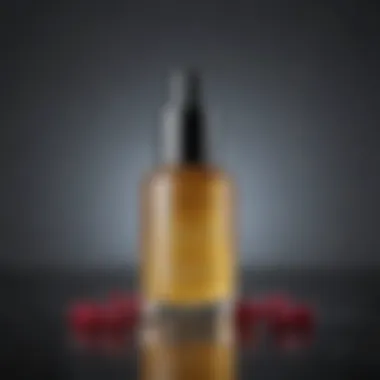Expert Skincare Strategies for Managing Breakouts and Achieving Clearer Skin


Beauty Tips and Tricks
When it comes to managing breakouts and maintaining clear, healthy skin, incorporating effective skincare routines is paramount. Properly caring for your skin can significantly impact the frequency and severity of breakouts, allowing you to achieve a radiant complexion. From gentle cleansing techniques to targeted treatments, a tailored skincare regimen can make a notable difference in managing breakouts and enhancing skin health
Skincare Routine Tips
Developing a consistent skincare routine tailored to your skin type and concerns is essential for managing breakouts. Cleansing your face twice daily with a gentle, non-comedogenic cleanser helps to remove dirt, oil, and impurities that can clog pores and lead to breakouts. Incorporating exfoliation 2-3 times per week can aid in sloughing off dead skin cells, preventing congestion and promoting cell turnover. Additionally, using a lightweight moisturizer that won't clog pores and applying a broad-spectrum sunscreen daily can further support skin health and reduce breakouts.
Haircare Hacks
While often overlooked, proper hair care is also crucial for managing breakouts, especially along the hairline and forehead. Keeping your hair clean and avoiding heavy styling products that can transfer onto your skin and clog pores is important. Opting for hairstyles that keep hair away from your face can also minimize contact between hair oils and your skin, reducing the risk of breakouts in these areas
Makeup Application Techniques
When dealing with breakouts, choosing the right makeup products and applying them skillfully can help camouflage blemishes without exacerbating them. Opt for non-comedogenic, oil-free formulations that won't aggravate acne-prone skin. Using clean brushes and sponges to apply makeup can prevent bacterial transfer and potential breakouts. Additionally, blending makeup seamlessly and avoiding heavy layers can create a natural-looking finish while allowing your skin to breathe.
Product Reviews ### Skincare Product Reviews Makeup Product Reviews Haircare Product Reviews
Makeup Trends ### Seasonal Makeup Trends Celebrity Makeup Looks Latest Beauty Influencer Recommendations
Expert Beauty Advice ### Professional Makeup Artist Insights Skincare Specialist Recommendations Hair Stylist Tips
Beauty Industry News ### Product Launch Updates Beauty Event Coverage Celebrity Beauty Collaborations
Understanding Breakouts
What Are Breakouts?
Definition of Breakouts
Breakouts refer to skin issues characterized by the appearance of blemishes, pimples, and inflammation. Understanding the Definition of Breakouts is pivotal in identifying the root causes of skin problems. By recognizing the key characteristics of breakouts, individuals can tailor their skincare routine to address specific concerns effectively. The Definition of Breakouts serves as a cornerstone in this article, guiding readers towards actionable solutions for managing skin issues.
Types of Breakouts
Exploring the various Types of Breakouts sheds light on the distinct nature of skin problems individuals may encounter. By categorizing breakouts based on their characteristics and triggers, individuals can pinpoint suitable treatment approaches. Understanding the Types of Breakouts equips readers with the knowledge necessary to differentiate between different skincare concerns, enabling targeted interventions for each specific issue.


Causes of Breakouts
Hormonal Factors
Hormonal Factors play a significant role in determining the skin's condition, often influencing sebum production and pore clogging. Understanding how Hormonal Factors contribute to breakouts allows individuals to adopt tailored skincare routines that balance hormonal fluctuations. By addressing hormonal imbalances effectively, individuals can mitigate the impact of these factors on their skin, promoting clearer and more radiant complexion.
Dietary Influences
Dietary Influences encompass the impact of nutrition on skin health, emphasizing the importance of a balanced diet for overall well-being. By examining the role of Dietary Influences in breakouts, individuals can make informed choices regarding their food consumption to support skin clarity and vitality. Understanding how dietary choices affect skin condition empowers individuals to align their eating habits with skincare goals, fostering long-term skin health.
Skincare Habits
Skincare Habits encompass the daily practices individuals engage in to maintain skin hygiene and health. By addressing the key characteristics of Skincare Habits, readers can optimize their routines for maximum efficacy. Understanding the significance of consistent and suitable skincare habits enables individuals to establish a solid foundation for managing breakouts and promoting skin wellness.
Building an Effective Skincare Routine
To effectively manage breakouts, establishing a robust skincare routine is crucial. A well-designed skincare regimen can help address skin concerns, prevent breakouts, and promote overall skin health. By choosing suitable products and adhering to consistent practices, individuals can achieve clearer and healthier skin. Building an Effective Skincare Routine is the cornerstone of combating breakouts and maintaining skin vitality. This section delves into the key components of a successful skincare routine, offering insights into product selection and daily practices.
Choosing the Right Products
When it comes to choosing skincare products for managing breakouts, the selection process plays a pivotal role in achieving desired outcomes. The right products can make a significant difference in addressing skin issues and promoting clarity. Key considerations include identifying ingredients that target specific concerns while avoiding irritants that may exacerbate breakouts. By selecting products tailored to individual skin needs, one can lay a solid foundation for an effective skincare routine.
Ingredients to Look for
Selecting products with beneficial ingredients is essential in combating breakouts. Ingredients like salicylic acid, benzoyl peroxide, and niacinamide are known for their anti-acne properties, helping to unclog pores, reduce inflammation, and regulate sebum production. These components play a crucial role in maintaining clear and balanced skin, making them popular choices in skincare formulations.
Avoiding Common Irritants
In contrast, it is equally important to steer clear of common irritants that can trigger breakouts or sensitivities. Ingredients such as alcohol, artificial fragrances, and harsh detergents may disrupt the skin's barrier function, leading to increased inflammation and breakouts. By avoiding these irritants, individuals can prevent potential skin reactions and maintain a healthy complexion.
Daily Skincare Practices
Incorporating consistent daily skincare practices is essential for managing breakouts and promoting skin resilience. Cleansing techniques, exfoliation methods, and moisturizing tips form the basis of a well-rounded skincare routine, providing essential nourishment and protection for the skin.
Cleansing Techniques


Effective cleansing is key to removing impurities, excess oil, and environmental pollutants from the skin's surface. Using gentle cleansers suitable for your skin type helps prevent clogged pores and breakouts, promoting a clean and refreshed complexion. Proper cleansing techniques ensure that the skin remains clear and receptive to subsequent treatment steps.
Exfoliation Methods
Exfoliation plays a vital role in maintaining smooth and radiant skin by sloughing off dead skin cells and unclogging pores. Mechanical or chemical exfoliants can help improve skin texture, reduce blemishes, and enhance product absorption. However, it is essential to exfoliate in moderation to avoid irritating the skin and exacerbating breakouts.
Moisturizing Tips
While addressing breakouts, it is crucial to maintain skin hydration and barrier function with appropriate moisturizing techniques. Choosing non-comedogenic and lightweight moisturizers helps prevent excess oil production without compromising skin hydration. Proper moisturization supports skin repair and rejuvenation, contributing to overall skin health and clarity.
Preventive Measures for Breakouts
Healthy Lifestyle Choices
Balanced Diet
When exploring the role of a balanced diet in skincare routines, its impact on skin health becomes evident. A balanced diet rich in nutrients such as vitamins, minerals, and antioxidants aids in nourishing the skin from within, promoting a clear and radiant complexion. The incorporation of essential fatty acids and hydration-promoting foods contributes to skin hydration and elasticity, essential for combatting breakouts. Embracing a balanced diet as a skincare cornerstone fosters overall well-being while enhancing skin resilience against external stressors.
Adequate Hydration
Adequate hydration stands as a fundamental pillar in skincare practices, contributing significantly to skin health and vitality. Optimal hydration levels ensure the skin functions optimally, facilitating cell turnover and toxin removal processes critical for maintaining clear skin. Water intake not only hydrates the skin but also supports overall bodily functions, promoting detoxification and a healthy glow. Emphasizing adequate hydration as part of a skincare regimen empowers individuals to nurture their skin from the inside out, fortifying its natural barrier and reducing breakout occurrences.
Stress Management
Environmental Factors
Impact of Pollution
Exploring the impact of pollution on skin health reveals its detrimental effects on breakouts and overall skin condition. Pollution particles can clog pores, increase inflammation, and accelerate skin aging, contributing to breakouts and skin imperfections. Understanding the role of pollution in skincare routines underscores the importance of incorporating protective measures such as thorough cleansing and antioxidant-rich skincare products. By shielding the skin from environmental aggressors, individuals can safeguard against breakouts and maintain a healthy complexion.
Sun Protection
Sun protection emerges as a critical aspect of skincare routines aimed at managing breakouts and preserving skin health. Prolonged sun exposure can exacerbate acne, trigger inflammation, and accelerate skin damage, underscoring the necessity of sun protection measures. Incorporating broad-spectrum sunscreen into daily skincare practices shields the skin from harmful UV rays, reducing the risk of breakouts and premature aging. Prioritizing sun protection as a preventive measure bolsters skin defense mechanisms, promoting clarity and resilience against external stressors.
Targeted Treatments for Breakouts


Over-the-Counter Options
Topical Treatments
Topical Treatments are vital components of skincare routines targeting breakouts, known for their direct application on affected areas to treat specific skin issues effectively. These treatments typically contain active ingredients such as benzoyl peroxide or salicylic acid, which are renowned for their acne-fighting properties. The key characteristic of Topical Treatments lies in their ability to penetrate the skin's surface, targeting breakouts at their source. This targeted approach makes Topical Treatments a popular choice for individuals seeking immediate results and concise application methods. Despite their efficacy, some individuals may experience dryness or irritation as potential disadvantages of using Topical Treatments, underscoring the importance of understanding one's skin sensitivity and adjusting usage accordingly.
Spot Treatments
Spot Treatments serve as localized remedies for individual blemishes, offering a targeted solution for treating specific breakouts swiftly. The key characteristic of Spot Treatments is their concentrated formula, designed to deliver potent ingredients directly onto blemishes to accelerate healing and reduce inflammation. This precise application makes Spot Treatments a beneficial choice for addressing isolated breakouts without affecting unaffected areas of the skin. While Spot Treatments excel in their targeted efficacy, there may be limitations in treating widespread acne concerns or preventing future breakouts, necessitating a comprehensive approach alongside these treatments to maintain clear skin over time.
Professional Interventions
Dermatological Procedures
Dermatological Procedures encompass a range of treatments administered by dermatologists to address more severe or persistent forms of acne. These procedures often include techniques such as chemical peels, laser therapy, or microdermabrasion, targeting deep-seated acne issues that may not respond optimally to topical treatments alone. The key characteristic of Dermatological Procedures is their ability to provide tailored solutions for complex skin conditions, offering interventions customized to individual skin needs. While Dermatological Procedures showcase significant efficacy in treating stubborn acne, potential disadvantages may include higher costs and longer recovery times, requiring careful consideration and consultation with dermatology specialists.
Consulting a Skincare Specialist
Consulting a Skincare Specialist is a valuable step in developing a personalized and effective skincare regimen tailored to one's unique skin concerns. Skincare specialists possess expertise in identifying underlying causes of breakouts and recommending targeted interventions to address these issues effectively. The key characteristic of consulting a Skincare Specialist lies in their ability to offer professional guidance and personalized treatment plans based on individual skin assessments. Seeking advice from a skincare specialist can provide valuable insights into optimal product selection, treatment methods, and long-term skincare strategies, aiding individuals in achieving and maintaining clear, healthy skin. While consulting a skincare specialist can offer tailored solutions, potential disadvantages may include higher consultation fees or limited accessibility, necessitating a balanced approach in integrating professional interventions with at-home skincare practices.
Maintaining Clear Skin Over Time
Maintaining clear skin over time is a crucial aspect of any skincare regimen, ensuring lasting results and overall skin health. In this section, we delve into the significance of maintaining clear skin over an extended period. Consistency in skincare practices plays a pivotal role in achieving and sustaining healthy skin. By adhering to a regular routine, individuals can effectively manage breakouts and improve skin condition over time. Moreover, adapting skincare practices to suit changing skin needs is essential for long-term skin health.
Consistency in Skincare
Long-Term Approach
The long-term approach to skincare emphasizes the importance of persistent dedication to a skincare routine to achieve optimal results. This approach advocates for consistency in product usage, emphasizing gradual improvements rather than expecting immediate transformations. By committing to a long-term skincare approach, individuals can witness sustainable changes in their skin quality and texture, promoting long-lasting benefits.
Adapting to Skin Changes
Adapting to skin changes is a key element in skincare maintenance as skin needs evolve over time. Recognizing and responding to changes in skin texture, tone, and sensitivity allows for tailored adjustments to one's skincare routine. This flexibility ensures that skincare practices remain effective and continue to address individual skin concerns, adapting to varying environmental factors and lifestyle influences.
Tracking Progress
Monitoring Skin Condition
Monitoring skin condition involves regularly evaluating skin texture, hydration levels, and any signs of irritation or breakouts. This practice enables individuals to assess the effectiveness of their current skincare routine and identify areas for improvement. By tracking skin condition closely, adjustments can be made promptly to address emerging concerns and maintain skin health.
Adjusting Routine as Needed
Adjusting the skincare routine as needed involves making modifications based on observed changes in skin condition or response to products. This adaptive approach ensures that skincare practices remain suitable and effective in addressing specific skin issues. By being responsive to skin changes and product efficacy, individuals can optimize their skincare routine for consistent results and long-term skin benefits.







